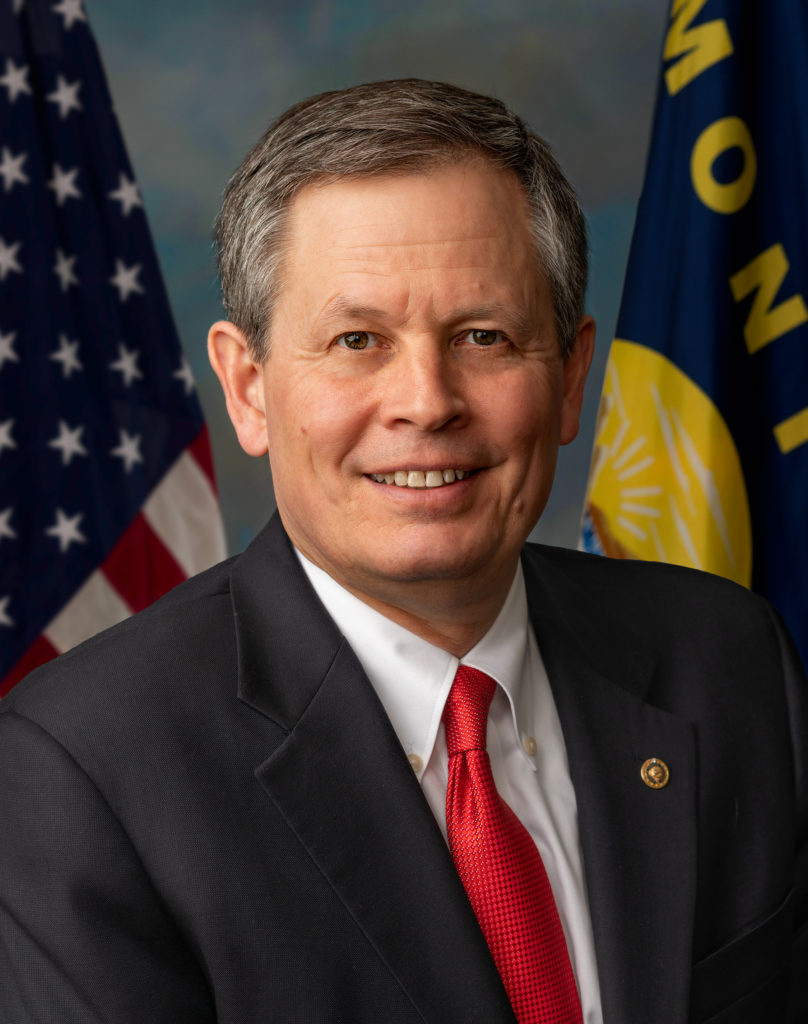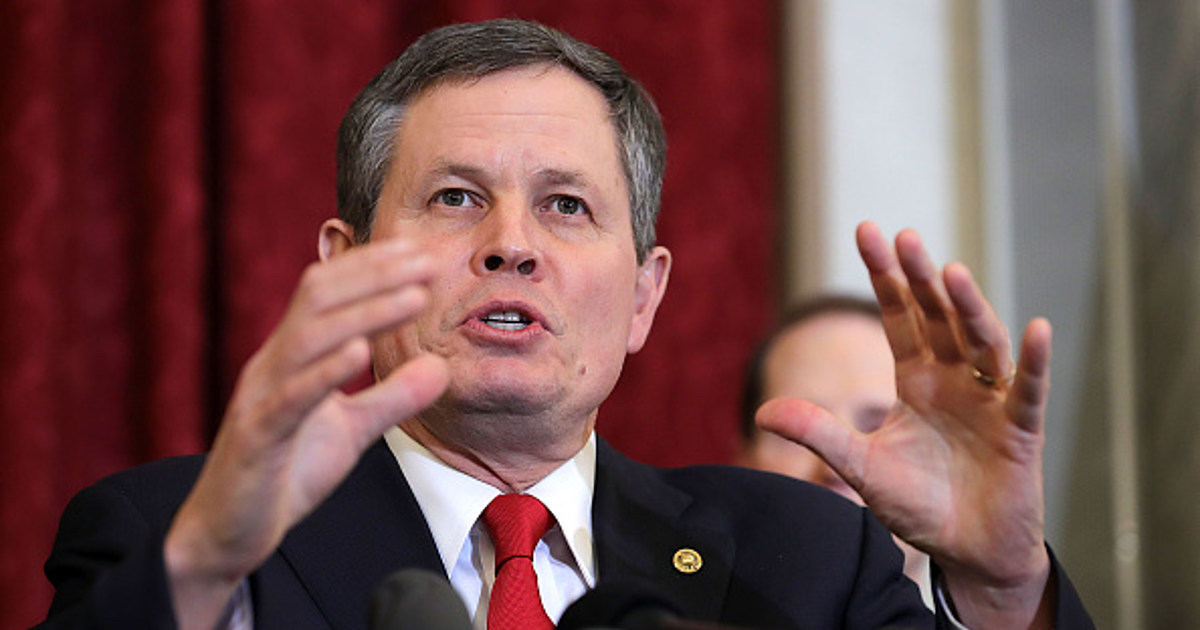Key actions and positions posted on the intersection of disability and education, jobs, immigration, climate crisis, criminal justice and more

Helena, MT. Sept. 10 – Incumbent Republican Senator Steve Daines has responded to a detailed candidate questionnaire on disability issues. The questionnaire is from RespectAbility, a nonpartisan nonprofit disability organization that does not endorse candidates. The questionnaire is purely for educational purposes. RespectAbility has reached out to key Senate and gubernatorial campaigns on both sides of the aisle and will be posting all responses on The RespectAbility Report. The full text of RespectAbility’s questions and Sen. Daines’ responses follow:
1. Learning during the COVID-19 pandemic has led to more issues and concerns for all students and their families, but this is especially true for students with disabilities. Additionally, the gap in graduation and drop-out rates between students with and without disabilities continues to undermine their futures. For example, in the class of 2018, only 66 percent of Black students with disabilities, 71 percent of Hispanic students with disabilities, 77 percent of white students with disabilities, and 79 percent of Asian-American students with disabilities completed high school. Furthermore, just seven percent of students born with a disability graduate from college. What is your plan for ensuring that all students with disabilities receive a quality and appropriate education to acquire the critical and marketable skills necessary to compete in a job-driven economy?
We need to ensure that all Americans with disabilities have access to the education opportunities that best fit their needs.That’s why I have always supported school choice – we need to be empowering parents and students to find what best fits them. As a father of four children, I understand that what one kid needs isn’t the same as what the other may need – that’s why as families, we must have the tools to ensure each one of our children has the education opportunities that’s the best option for them. I was proud to support IDEA funding, which provides critical education resources for those with disabilities and I’ll continue working to ensure those with disabilities have the resources they need to get the education they deserve and compete in today’s economy.
2. In the economic expansion prior to the COVID-19 pandemic, the national employment rate for working-age people with disabilities in America was 37.6 percent compared to 77.8 percent of people without disabilities. Further, there continues to be significant disparities in employment outcomes within the disability community, which varies from state to state. There are significant racial disparities in disability employment outcomes. 38.9 percent of working-age white people with disabilities have jobs compared to only 29.7 percent of working-age Black people with disabilities had jobs, 39.4 percent of working-age Hispanics with disabilities and 43.2 percent of working-age Asian-Americans with disabilities. The pandemic has ravaged the disability community and more than 1 million workers with disabilities have lost their jobs. If elected, what will you do to ensure that the government is removing barriers and promoting high quality, inclusive services built on evidence-based policies, practices and procedures leading to competitive, meaningful careers, which includes promoting entrepreneurial opportunities?
As a chemical engineer, I know how to solve problems and get results. Ensuring those with disabilities have the necessary opportunities and resources to compete in today’s work force is no different – that’s why I will always work with Montana families and students to support programs that drive results. All Americans should have the opportunity to live a meaningful life full of purpose. I’ve been a proud supporter of NIH funding to support scientific research programs related to learning disabilities, rehabilitation, and other helpful services for those with disabilities as well as have introduced the Autism CARES Act, which expands Autism Spectrum Disorder (ASD) research at the NIH, as well as promotes ASD education, early detection and intervention activities. I will always support elevating those with disabilities and giving them and their families the tools they need to succeed.
3. The disability community fundamentally believes in the need to ensure “Nothing about us, without us” – real inclusion and places at decision making tables – because we know solutions that work and want to be a part of making our communities stronger. What specific measures have you taken to make your campaign accessible for, and inclusive of, people with disabilities, as every issue impacts our lives?
In today’s world, accessibility for all Americans is key. I’ve worked to ensure my campaign is transparent, open, and easily reached for all Americans and Montanans. My campaign team works long-and-hard to receive input from every corner of our state to ensure we are successfully reaching as many people as possible – including those with disabilities and their families.
4. RespectAbility published Disability in Philanthropy & Nonprofits, based on our study on the levels of disability inclusion in the social sector across the country. This largescale study found significant data showing that nationwide, organizations overall want to be inclusive, but are unintentionally excluding the one-in-five people with disabilities. What will you do to promote policies and practices designed to support full community engagement, access and inclusion of people with disabilities?
All Montanans and Americans should be treated equally and discrimination of any kind is unacceptable in our society. That’s why I’ve introduced legislation like the Disability Integration Act, which prohibits government entities and insurance providers from denying service to those with disabilities. We must embrace those with disabilities, because there is dignity in all human life. I will continue fighting to ensure all Americans and Montanans, including those with disabilities, have the opportunity to play an active role in our societies and ensure they are welcomed into our communities with open arms.
5. Elected officials have multiple opportunities to demonstrate a strong commitment to diversity and inclusion, full community participation and celebrating the contributions and accomplishments of people with disabilities through press releases, speeches, celebratory events including National Disability Employment Awareness Month. There are significant stigmas that create attitudinal barriers that limit options and perpetuates low expectations for people with disabilities. What measures will you take to combat these stigmas and promote opportunities for people with disabilities?
All Montanans and Americans should be treated with kindness and fairness without any form of discrimination. We must all stand together in supporting those with disabilities. I’ve long supported programs such as the Special Olympics, giving those with disabilities the opportunity to compete in athletics and represent Montana at the national level. Every year, it’s an honor to visit with Montana’s Special Olympians, and I’ll continue supporting them every step of the way.
6. In our nation’s public schools, there are 6.3 million students with disabilities. The changing demographics of America are reflected in these students, with 11.4 percent of students with disabilities nationwide, almost 720,000, also identified as English-language learners. Their accommodation needs are compounded by the fact that many come from households that do not speak English at home, adding an extra challenge for parental interaction. It can also be harder to diagnose disabilities in children when they are English language learners. Additionally, immigration issues and fears over the public charge rule impact students with disabilities, their families and the wider workforce. What policies would you advance to enable students and their families who are English language learners with disabilities to succeed in school and employment?
Ensuring those with disabilities have access to the education they need is critical to their success. Families must be able to choose the school and program that best fits their children’s needs, without having to worry about how much it’ll cost. That’s why I’ll always support school choice programs – because what each family needs for their students, especially those with disabilities, should be a decision that lies with that family.
I’ve been proud to support IDEA funding which provides education resources for those with disabilities. I was also glad to support and see the Workforce Innovation and Opportunity Act signed into law because it created rehabilitation and vocational training programs for those with disabilities. We must continue working to ensure those with disabilities have the tools they need – and I’m glad to continue in that fight.
7. Housing, criminal justice, climate issues, transportation and every other area have significant impacts on people with disabilities. What additional policies and priorities, other than those already discussed above, do you plan to focus on to improve the lives of people with disabilities?
The most important thing we can do is always remember to value the dignity of every single human life. It’s been an honor to meet with, listen to, and always support those with disabilities, and I look forward to continuing to do so if elected to a second term as Montana’s U.S. Senator.
Sen. Bullock is facing off against current Democratic Senate candidate and current Montana Gov. Steve Bullock in this year’s closely watched election for the U.S. Senate. Gov. Bullock recently answered the RespectAbility Disability Questionnaire and you can find his responses on our website here.
RespectAbility is a nonprofit, nonpartisan organization that fights stigmas and advances opportunities so people with disabilities can fully participate in all aspects of their communities. RespectAbility does not rate or endorse candidates. View more coverage of 2020 candidates.

[…] Read Response in Full […]
[…] Daines completed the 2020 Disability Voter Questionnaire for presidential, Senate and gubernatorial candidates put out by the national disability […]
[…] with disabilities already have been declared as winners. These individuals completed the 2020 Disability Voter Questionnaire for presidential, Senate and gubernatorial candidates put out by the national disability […]
[…] Senate seat, beating Republican incumbent Sen. Cory Gardner. Meanwhile, incumbent Republican Sen. Steve Daines will continue to represent Montana in the U.S. Senate, beating Democratic challenger Gov. Steve […]